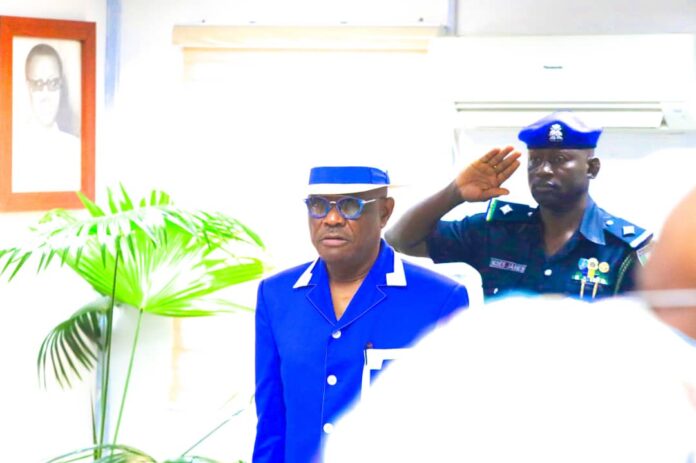Lere Olayinka, Senior Special Assistant on Public Communications and New Media to the Federal Capital Territory (FCT) Minister, Nyesom Wike, has categorically denied claims that the minister is managing the FCT Administration (FCTA) based on religious considerations.
The sharp rebuttal came in response to remarks made by Prof. Ishaq Akintola, Director of the Muslim Rights Concern (MURIC). Akintola had criticized Wike over the suspension of the Executive Secretary of the Federal Capital Development Authority (FCDA), Engr. Shehu Ahmad Hadi.
Olayinka dismissed Akintola’s statements as an attempt to sow discord, calling on the MURIC Director to focus on issues related to Islamic propagation rather than inflaming religious tensions.
“The suspended FCTA Executive Secretary was not appointed because he was a Muslim,” Olayinka declared in a statement issued on Sunday. “Anyone trying to cloak his suspension in religious garments is doing a disservice to the harmony Nigerians have fought to maintain.”
The aide stressed that the decision to suspend Engr. Hadi was neither religious nor personal, emphasizing that the office of the FCDA Executive Secretary was a public institution subject to standard governance protocols. “This is not a family chieftaincy title,” Olayinka quipped.
No Obligation to Justify Suspension
Defending Wike’s actions, Olayinka noted that government leaders have the prerogative to make personnel changes without public justification. “Just as it is not obligatory for the one who appoints to give reasons for the appointment, it will also not be obligatory for the one who suspends to explain such actions to the public, as long as the individual in question understands why they were suspended,” he stated.
The aide assured Abuja residents that the business of the FCDA continues unabated despite the leadership change.
Prof. Akintola’s criticism had focused on the suspension’s perceived religious undertone, alleging favoritism in the FCTA’s management. However, Olayinka dismissed these claims, urging Akintola to adhere to the teachings of Prophet Muhammad (PBUH) on obedience to authority.
Citing a well-known Hadith, Olayinka remarked, “It was narrated on the authority of Abu Huraira that Prophet Muhammad (PBUH) said: ‘It is obligatory for you to listen to the ruler and obey him in adversity and prosperity, in pleasure and displeasure, and even when another person is given undue preference over you.’”
He continued, “If Prof. Akintola understands and practices this teaching, he would advise Engr. Hadi to accept his suspension in good faith rather than sponsor media attacks that could fan the embers of discord.”
This controversy arises amid heightened scrutiny of Wike’s tenure as FCT Minister, a position he assumed in August 2023. Known for his no-nonsense approach as the former Governor of Rivers State, Wike has taken bold steps to address alleged inefficiencies and promote infrastructural development in Abuja.
The minister’s critics, however, argue that his administration has been marked by heavy-handedness, citing the demolition of N200 billion worth of housing projects and other contentious policies.
In recent weeks, Wike’s allies have worked to counter perceptions of bias, emphasizing his focus on transforming the FCT into a model city. A pro-Wike group recently described allegations against him as attempts to derail ongoing infrastructural development.
Background on FCTA Leadership
The FCTA oversees Abuja’s urban planning, development, and administration under the minister’s guidance. As head of the FCDA, the Executive Secretary plays a critical role in executing these responsibilities.
Engr. Shehu Ahmad Hadi, a seasoned civil servant, had been in office since his appointment by the previous administration. His suspension has sparked debates on transparency and accountability in the FCT’s governance.
While critics like Akintola view the suspension as religiously motivated, analysts argue it reflects Wike’s determination to assert control and demand results from his team.
Religious tensions in Nigerian politics are not new, often complicating national unity. Advocacy groups like MURIC play a crucial role in defending the rights of Muslims, but some observers worry that inflammatory statements could erode interfaith harmony.
Olayinka’s remarks underscore these concerns. “Religious leaders must tread cautiously and avoid amplifying unfounded claims. Unity is critical for Nigeria’s progress,” he said.

